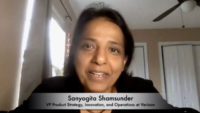During ETC@USC’s second Executive Coffee with… installment of the Spring 2021 series, Sanyogita Shamsunder, VP of product strategy, innovation and operations at Verizon engaged a group of eight USC students from cinema, engineering and business in a one-hour discussion of the question: “What comes after Zoom and entertainment apps?” Shamsunder, whose team is focused on new technology innovation and bringing new products and experiences to consumer and enterprise customers, was joined by team members Andrew Herson, who is focused on B2B2C applications, and Zachary Drossman, who heads concept development at Verizon’s 5G Labs.
Arundhati Kurup, a computer science graduate student, pointed out that COVID-19 has accelerated the adoption of video conferencing and has given us a point of separation from the past. She would like to see a more seamless way to interact with less friction from the enabling technology.

Sophomore business major Sophie Tan thought that after so many Zoom meetings the audio-only Clubhouse experience of just focusing on your voice is relaxing. Plus, it allows for the spontaneity that we experience in real life social settings.
Heather Giles, a computer science graduate student, thinks the next big thing will be technology that can replicate “the full bandwidth of in-person communication” so we can naturally manage blended real and virtual meetings. She also thought innovation should pay more attention to the audio in virtual spaces; it should track what we would expect to hear in real life.
Senior computer science major Denilson Mirafuentes pointed out that companies like Google are investing in physical office space. The future may be, at least in part, a return to the past and away from all of this virtualization.
Mirafuentes, Giles, and applied data science grad student Phuong Ngo all gave reasons why AR glasses could have a higher price point than VR glasses. AR glasses can be more socially attractive, more useful, and can more directly help people with disabilities fully participate in everyday life.
Regarding security and privacy, Mirafuentes quipped that after people watch a video or documentary on those issues, for the next few days they’ll lecture their friends about the issue. But their concerns won’t stop them from using the apps. Ngo said she is amazed that people are still surprised when they see ads related to their recent online activities. The students discussed the personalization and data gathering trade-off and how proactively educating people about that trade-off could counter the spread of misinformation about personal data management and use.
For more of the discussion, check out the 7-minute highlight video online.
The ETC@USC’s Executive Coffee with… Series
The Entertainment Technology Center at USC produced its second series of virtual “executive coffee discussions” during the Spring 2021 semester. These one-hour discussions provide an opportunity for students and ETC member company executives to connect and discuss topics of mutual interest during this period of remote learning and social distancing.
For each session an executive posed one question or topic, students from across USC submitted brief statements of interest, and the ETC invited between 6 and 12 students to participate in the Zoom meeting. Each session was recorded and a 7- to 10-minute highlight video was produced.
The sessions included: Verizon — “Expectations for Entertainment and UI/UX” (March 15), Verizon — “What Comes After Zoom and Entertainment Apps” (March 24), Warner Bros. — “AI and Ethics” (March 30), Disney — “The Future of Immersive Media Storytelling” (April 7), and Warner Bros. — “The Post-Pandemic Future of Virtual Production” (April 21).
The videos are available on the Executive Coffee with… page online.

No Comments Yet
You can be the first to comment!
Sorry, comments for this entry are closed at this time.